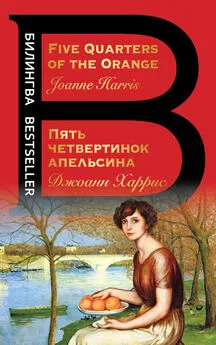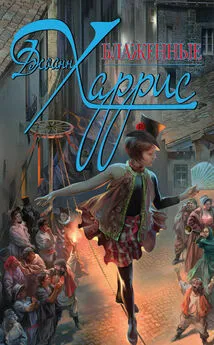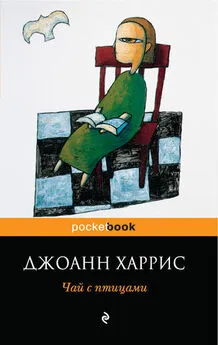Джоанн Харрис - Five Quarters of the Orange / Пять четвертинок апельсина
- Название:Five Quarters of the Orange / Пять четвертинок апельсина
- Автор:
- Жанр:
- Издательство:неизвестно
- Год:2022
- Город:Москва
- ISBN:978-5-04-163417-9
- Рейтинг:
- Избранное:Добавить в избранное
-
Отзывы:
-
Ваша оценка:
Джоанн Харрис - Five Quarters of the Orange / Пять четвертинок апельсина краткое содержание
Оригинальный текст и перевод на страницах одной книги – это эффективный способ усовершенствовать знание английского языка.
От матери в наследство Фрамбуаза получила альбом с кулинарными рецептами – негусто, если учесть, что ее брату Кассису досталась ферма, а старшей сестре Рен-Клод – винный погреб со всем содержимым. Но весь фокус в том, что на полях альбома, рядом с рецептами разных блюд и травяных снадобий, мать записывала свои мысли и признания относительно некоторых событий ее жизни – словом, вела своеобразный дневник. И в этом дневнике Фрамбуаза пытается найти ответы на мрачные загадки прошлого.
«Харрис создала многослойный сюжет, усыпанный восхитительными описаниями французских книг и раскрывающий встряхивающий эффект войны на хрупкое семейное устройство». – Publishers Weekly
«Из ее книг эта – пока самая сильная: острая, с горчинкой…» – Independent
В формате PDF A4 сохранен издательский макет.
Five Quarters of the Orange / Пять четвертинок апельсина - читать онлайн бесплатно ознакомительный отрывок
Интервал:
Закладка:
Hourias knows already. I see him looking at me sometimes. Pity and curiosity, like I was something he ran over in the road. Last night he saw me coming out of La Rép with the things I need to buy there. He didn’t say anything, but I knew he’d guessed. He thinks we should marry, of course. It makes sense to him, widow and widower, marrying their land together. Yannick had no brother to take over when he died. And a woman isn’t expected to run a farm alone.
If she had been a naturally sweet woman, perhaps I might have suspected something sooner. But Mirabelle Dartigen was not a sweet woman. She was rock salt and river mud, her rages as quick and furious and inevitable as summer lightning. I never sought the cause, merely avoiding the effect as best I could.
15
There were no more trips to Angers that week, and neither Cassis nor Reinette seemed inclined to speak of our meeting with the Germans. As for myself, I was reluctant to mention my conversation with Leibniz, though I was unable to forget it. It made me feel by turns apprehensive and oddly powerful too.
Cassis was restless, Reinette sullen and discontented, and to add to that it drizzled all week, so that the Loire swelled ominously and the sunflower fields were blue with rain. Seven days had passed since our last visit to Angers. Market day came and went; this time Reinette accompanied Mother to town, leaving Cassis and myself to prowl discontentedly through the dripping orchard. The green plums on the trees made me think of Leibniz, with an odd mixture of curiosity and disquiet. I wondered whether I would ever see him again.
Then, unexpectedly, I did.
Early in the morning of the next market day, it was Cassis’s turn to help with the provisions. Reine was fetching the new cheeses, wrapped in vine leaves, from the coolroom and Mother was collecting eggs from the henhouse. I was just back from the river with the morning catch, a couple of small perches and bleaks that I had chopped for bait and left in a bucket by the window. It was not the Germans’ usual day to call, and as a result it was I who happened to open the front door when they knocked.
There were three of them: two I did not recognize, and Leibniz, very correct now in uniform, standing with a rifle slung into the crook of his arm. His eyes widened a little in surprise when he saw me, then he smiled.
If it had been any other German standing there I might have shut the door in their faces, as Denis Gaudin did when they came to requisition his violin. I would certainly have called Mother. But on this occasion I was unsure; I fidgeted uneasily on the doorstep, wondering what to do.
Leibniz turned to the other two and spoke to them in German. I thought I understood from the gestures that accompanied his words that he intended to search our farm himself while the others moved down the lane toward the Ramondin and Hourias places. One of the other Germans looked at me and said something. The three of them laughed. Then Leibniz nodded and, still smiling, stepped past me into our kitchen.
I knew I should call Mother. When the soldiers called she was always more sullen than ever, stonily resentful of their presence and their casual appropriation of anything they required. And today of all days! Her temper was bad enough as it was: this would be the final blow.
Supplies were getting scarce, Cassis had explained when I had asked him about it. Even Germans had to eat. “And they eat like pigs!” he had continued with indignation. “You should see their canteen – whole loaves of bread, with jam and pâté and rillettes and cheese and salted anchovies and ham and sour cabbage and apple – you wouldn’t believe it!”
Leibniz closed the door behind him and looked around. Away from the other soldiers his posture was relaxed, more like a civilian’s. He reached in his pocket and lit a cigarette.
“What are you doing here?” I demanded at last. “We don’t have anything!”
“Orders, Backfisch,” said Leibniz. “Is your father about?”
“I don’t have a father,” I replied with a touch of defiance. “Germans killed him.”
“Ah. I’m sorry.” He seemed embarrassed, and I felt a little swell of pleasure inside. “Your mother, then?”
“Out back.” I glared at him. “It’s market day today. If you take our market stuff we won’t have anything left. We just manage as it is.”
Leibniz glanced around – a little shamefacedly, I thought. I saw him take in the clean tiled floor, the patched curtains, the scarred stripped – pine table. He hesitated.
“I have to do it, Backfisch,” he said softly. “I’ll be punished if I don’t obey orders.”
“You could say you didn’t find anything. You could say there was nothing left when you came.”
“Perhaps.” His eyes lit on the bucket of scraps by the window. “Fisherman in the family, is there? Who is it, your brother?”
I shook my head. “Me.”
Leibniz was surprised.
“Fishing?” he echoed. “You don’t look old enough.”
“I’m nine,” I said, stung.
“Nine?” Lights danced in his eyes, but his mouth stayed serious. “I’m a fisherman myself, you know,” he whispered. “What is it you fish for around here? Trout? Carp? Perch?”
I shook my head.
“What then?”
“Pike.”
Pikes are the cleverest of freshwater fish. Sly and cautious in spite of their vicious teeth, they need carefully selected bait to lure them to the surface. Even the smallest thing can make them suspicious: a fraction of a change in temperature; the hint of a sudden movement. There is no quick or easy way to do it; blind luck apart, catching pike takes time and patience.
“Well, that’s different,” said Leibniz thoughtfully. “I don’t think I could let down a fellow fisherman in trouble.” He grinned at me. “Pike, eh?”
I nodded.
“What d’you use, bloodworms or boluses?”
“Both.”
“I see.”
This time he did not smile; it was a serious business. I watched him in silence. It was a ploy that never failed to make Cassis uneasy.
“Don’t take our market stuff,” I repeated.
There was another silence. Then Leibniz nodded.
“I suppose I could manage to think of some story to tell them,” he said slowly. “You’d have to keep quiet, though. Or you could get me into real trouble. Do you understand?”
I nodded. It was fair. After all, he’d kept quiet about the orange. I spat on my palm to seal the bargain. He did not smile, but shook hands with perfect seriousness, as if this were an adult arrangement between us. I half-expected him to ask me for a favor in return, but he did not, and the thought pleased me. Leibniz wasn’t like the others, I told myself.
I watched him go. He did not look back. I watched him as he sauntered down the lane toward the Hourias farm and flicked his cigarette end into the outhouse wall, its glowing tip striking red sparks against the dull Loire stone.
16
I said nothing to Cassis or Reinette about what had occurred between Leibniz and myself. To have spoken of it to them would have robbed it of its potency. Instead I hugged my secret close, turning it over in my mind like a stolen treasure. It gave me a peculiarly adult feeling of power.
I now thought of Cassis’s film magazines and Reinette’s lipstick with a certain contempt. They thought they’d been so clever. But what had they really done? They’d behaved like children telling tales in school. The Germans treated them like children, bribing them with trinkets. Leibniz had not tried to bribe me. He had spoken to me as an equal, with respect.
The Hourias farm had been badly hit. A week’s supply of eggs requisitioned, half the milk, two whole sides of salted pork, seven pounds of butter, a barrel of oil, twenty-four bottles of wine (ill concealed behind a partition in the cellar), plus any number of terrines and preserves. Paul told me about it. I felt a small pang for him-his uncle provided most of the family’s supplies-but promised myself I would share my own food with him whenever I could. Besides, the season was just beginning. Philippe Hourias would make up his losses soon enough. And I had other things on my mind.
The orange bag was still hidden where I had left it. Not under my mattress-though Reinette still insisted upon keeping her original cache for the beauty aids she imagined to be secret. No, my secret place was a great deal more imaginative. I placed the bag in a small screw-top glass jar and sunk it elbow deep in a barrel of salted anchovies that my mother kept in the cellar. A piece of string tied around the lip of the jar would enable me to locate it when needed. Discovery was unlikely, as Mother disliked the pungent scent of the anchovies and usually sent me to fetch any that might be required.
I knew it would work again.
I waited until Wednesday evening. This time I hid the bag in the spill tray under the stove, where the heat would release the vapor the quickest. Sure enough, Mother was soon rubbing her temple as she worked at the stove, snapping sharply at me if I was late in bringing her flour or wood, scolding-mind you don’t chip my good plates, girl! – and sniffing the air with that animal look of confusion and distress. I closed the kitchen door for maximum effect, and the scent of orange invaded the room once again. I hid the bag in her pillow as before-the pieces of orange peel were crisp by then, blackened by the heat of the stove, and I felt sure that this would be the last time I used the orange bag-pushing it into the pillow beneath the striped slip.
Dinner was burnt.
No one dared mention it, though, and my mother fingered the black brittle lace of her charred pancakes and touched her temple over and over until I was sure I would scream. This time she did not ask whether we had brought oranges into the house, though I could tell she wanted to. She just touched and crumbled and fingered and fidgeted, sometimes breaking the silence with a fierce exclamation of rage at some trivial infringement of the house rules.
“Reine-Claude! Bread on the breadboard! I don’t want you getting crumbs on my clean floor!”
Her voice was waspish, exasperated. I cut a slice of bread, deliberately turning the bread over onto the breadboard so that the flat underside was uppermost. For some reason this always enraged Mother, as did my habit of cutting off the crusty piece from either end of the loaf and discarding the middle section.
“Framboise! Turn that bread over!” She touched her head again, fleetingly, as if checking it was still there. “How many times have I told you about-”
Then she froze midsentence, head on one side, mouth open.
She stayed that way for thirty seconds or so, staring at nothing with the face of a slow pupil trying to remember Pythagoras’s theorem or the rule of the ablative absolute. Her eyes were glassy-green and blank as winter ice. We looked at one another in silence, watching her as the seconds passed. Then she moved again, a brusque and typical gesture of irritation, and began to clear the dishes even though we were only halfway through the meal. No one mentioned that, either.
The next day, as I had predicted, she kept to her bed, and we went to Angers as before. Not to the pictures this time; instead we loitered in the streets, Cassis ostentatiously smoking one of his cigarettes, and settled on the terrasse of a town-center café, Le Chat Rouget. Reinette and I ordered diabolo-menthe, and Cassis began to order pastis, changing meekly to panaché beneath the supercilious gaze of the waiter.
Reine drank carefully, trying not to smear her lipstick. She seemed nervous, head ticking from side to side as if watching out for something.
Читать дальшеИнтервал:
Закладка:









